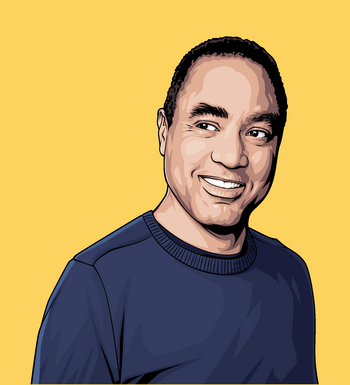What is Black English?
It’s a dialect that is spoken casually between most Black Americans. It’s similar to Standard English, but it has different expressions and its own complex set of rules and grammar. Most people assume those differences are mistakes. They see Black English as broken English. But linguists don’t see it that way.
How did Black English develop?
When slaves were brought to America, they learned English from people from Ireland or northern England who worked on the plantations and spoke in regional dialects. Adults don’t usually learn languages as well as children, so they simplified those dialects. When people learn a language, they tend to shave off any unnecessary parts of speech. The verb “to be,” for example, is complicated because it has so many forms. But you can get your meaning across without using it. Saying “she my sister” clearly means “she’s my sister.” Take that and a passel of other little subtractions and you get the kind of English people might hear as broken. But really, it’s just different.
You say in the book that Black English is a “social dialect.”
Yes, Black people use it when they’re comfortable with each other. They can slide in and out of it depending on the situation. But that is not what the book is about. I want to get across something much more specific, which is that linguistically there is nothing unsophisticated or broken about this dialect.
But it drives some people crazy when they hear the word aks used instead of ask.
Aks and ask are both from Britain. The fact that ask became standard is just an accident. Black people say aks because slaves worked on plantations with people who said aks, that’s all.
Is this the way languages evolve?
This is worldwide linguistic reality. When humans have to pick up a language quickly, typically their version is streamlined. Black English is a subtraction of Standard English, and Standard English is a subtraction of Old English to an even greater degree. If an Old English speaker heard modern Standard English, they would think it barbaric and ungrammatical.
The subtitle of your book calls Black English “America’s lingua franca.” What do you mean by that?
I mean that if you walk across the Columbia campus and listen to any group of white men talking casually, most of them will sound slightly “Blacker” than their fathers did at their age. That’s because there are certain aspects of Black English, such as cadence, syntax, and use of slang, that have seeped into the millennials’ speech repertoire. The culture of hip-hop has a lot to do with it. Black English suggests authenticity. It has also been said that it’s becoming a marker of masculinity. But it’s not as if a guy just decides to talk like Jay Z. None of this is conscious.
Has Black English inflected the way women talk?
Yes, but men tend to embrace vernacular forms more than women. So it’s more pronounced in men.
You say words are making the jump from Black usage to mainstream usage. Can the N-word make the jump?
There are two N-words. One is niggah, which Black men use to mean “buddy.” The other, nigger, is the slur. They are different words with different sound patterns. I understand why white guys might want to call each other niggah, but the truth is that the N-word is loaded. There are some very good reasons why it’s going to be hard for Black people to listen to that word come out of a white person’s mouth. We are just going to have to treat it as taboo.
So, millennials think Black English is cool. Is this a good thing?
Some people might say this is an example of cultural appropriation, but I don’t agree. It’s an indicator of acceptance. Racism persists in other aspects of American life, but this is evidence of a browning of our culture. People are converging linguistically, and I consider that an interesting and positive development.



